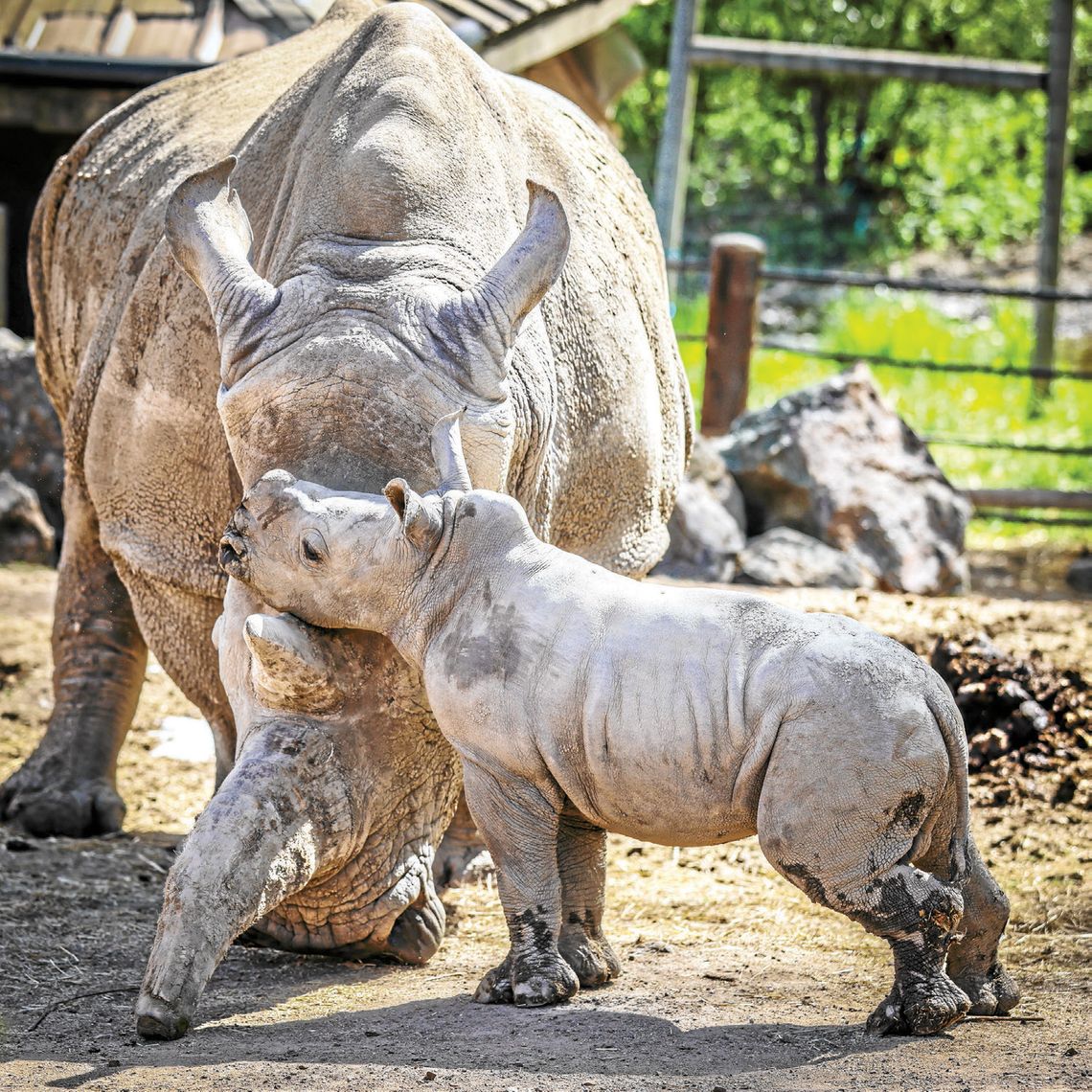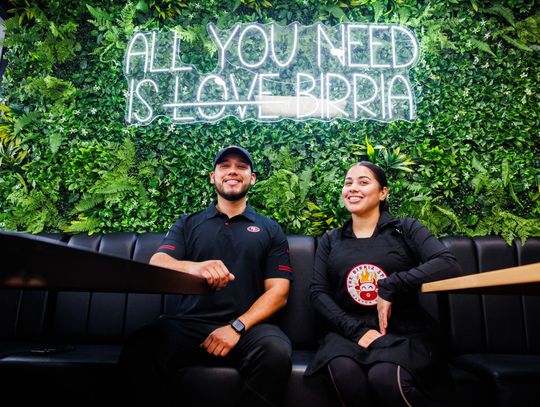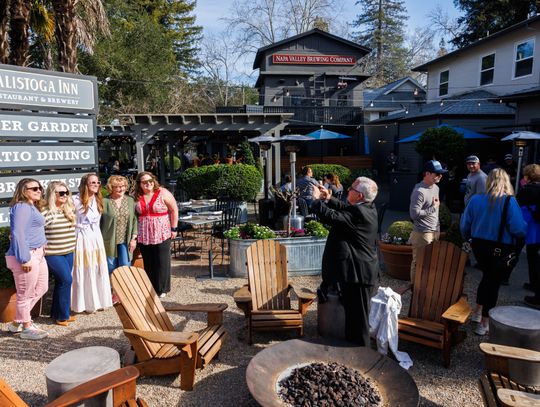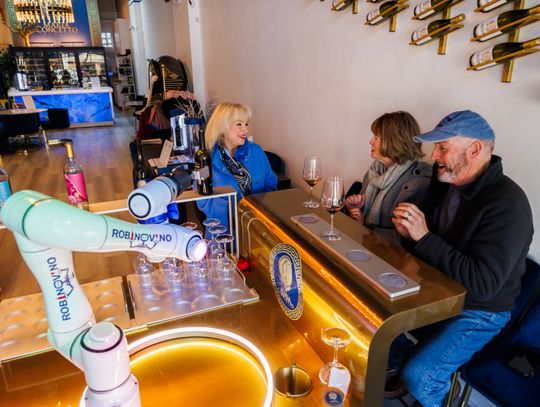From the top of our double-decker safari truck, my daughter Matilda and her friend Noelle squeal as they spot the “baby” rhino, Otto, weighing in at over 1,000 pounds. The Southern White rhino recently celebrated his first birthday, and as a male rhino, he will reach as much as 5,000 pounds like his father Ongave, who plays alongside him, gently knocking his horn.
Otto is one of the newest members of Sonoma County’s Safari West, a wildlife preserve and African tent camp in the foothills of the Mayacamas Mountains, just north of Santa Rosa and just an hour drive from Napa, along the Silverado Trail.
Our guide Brady pulls the jeep over to stop beside the rhino den and hops on the hood to share the story of the rhino’s near-threatened status, mostly due to poachers looking to profit off their horns. The rhino’s horns are perceived to have medicinal powers, Brady tells us, and serve as symbols of status and wealth in some cultures. Safari West has its own research team of veterinarians, biologists, and conservationists working on projects that include researching rhino reproduction using a combination of behavioral observation and thermal imaging.
Safari West was launched in the late 1980s to protect animals like Otto and raise awareness about wildlife issues. Founder Peter Lang grew up on Hollywood sets where his film and television director father Otto (rhino Otto’s namesake) raised exotic wildlife for films like “Daktari,” “Flipper” and “Sea Hunt.” In addition to its on-site research, the organization donates funds to global conservation projects, like the Cheetah Conservation Fund out of Namibia. Peter’s wife, Dr. Nancy Lang, a wildlife conservationist, helps lead the on-site research and manages the aviaries, including the massive walk-through aviary, the Amani Oasis, at the entrance of the ground, featuring birds from five different continents.
Brady hops back in the truck and drives off through the 400-acre oak woodland, where we spot zebras standing in pairs alongside the road like statues, ostriches who peer into our truck curiously poking a canvas bag on the front seat, and a herd of resting African cape buffalo. Few fences are in view as these “closures” give the animals ample space to roam. Brady puts our nerves at ease as he tells us that while the African cape buffalo — the third most dangerous animal behind the mosquito and the hippo — can be vindictive, hunting poachers for miles from the memory of their scent, they will only do so if you mess with them first.
I don’t hear a peep about boredom from the girls despite the tour being three hours long. We watch in awe at the giraffes circling our truck and sing “Stayin’ Alive” as the jeep bumps up, down and over steep, rolling hills. Brady passes around watusi cattle horns and black-tailed deer antlers, and hands us a real, not fertilized, ostrich egg. (They only have females on site as the males will chase down the trucks.) The girls carefully handle it, surprised by its substantial weight.
Safari West is one of those rare gems where parents have as much fun as the kids. We chose a day off from school to spend among the herds and feathered friends, but guests can choose to spend the night in one of 30 glamping tents, each imported from Botswana. These luxury tents feature en-suite bathrooms, hardwood floors and private viewing decks. I make a mental note that one would make a great 10-year-old birthday present come November.
We exit near the cheetah preserve, where three cheetahs lounge in the sun behind tall grasses. Brady asks if we know how fast a cheetah can run. Matilda pops up her hand to answer 70 miles per hour, excited to share a fact from her vast wildlife knowledge.
We are hungry after the three-hour tour but the Savannah Cafe, which offers an authentic South African Braai, a close cousin to American barbecue, is closed. Reserve a spot at the outdoor restaurant or try an off-campus favorite like the Flamingo Lazeaway Club at the renovated mid-century Flamingo Hotel, a fun and affordable overnight for families with a heated pool if glamping isn’t your thing.
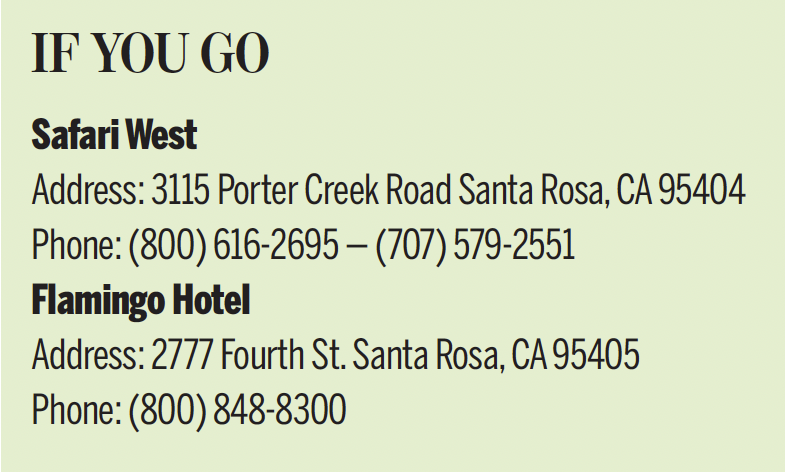
Private adults-only tours at Safari West include Winos and Rhinos, a wine tasting safari, Brews and Buffalo, a beer tasting, and Cheetahs and Chardonnay. Clearly, this is wine country, with an African view.

